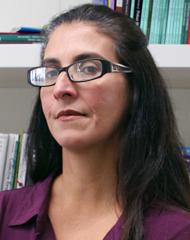"Religions intervene in public issues because the people who practice them are also part of society."
A Brazilian researcher has addressed the role of the Catholic Church in the defense of social rights after the dictatorship in Brazil.

PHOTO: Natalia Rouzaut
"Religions intervene in public issues because the people who practice them are also part of society". This was stated by Lilian Pinto Sales, a researcher at the Federal University of São Paulo (Brazil), during a visit to the Institute for Culture and Society (ICS) of the University of Navarra. According to the expert, although there is a separation between Church and State as institutions, it is difficult to delimit a boundary between Religion and Civil Society since its actors move between both spheres.
Pinto Sales gave as an example the case of Brazil where, after two decades of dictatorship, the Catholic Church played a very important role in the period of democratization. "Many movements for the defense of rights in Brazil were born very close to the Catholic Church" and its influence continues to be felt even though they are now autonomous, he said. This is the case of the Landless Rural Workers Movement (MST), the largest Brazilian social movement.
For the researcher, the Catholic Church was a fundamental actor in the defense of civil rights and in the democratization of the country and still plays a very important role. This can be seen in actions such as the synod of the Amazon, held in October 2019, where land rights, indigenous rights and the environment were defended.
The church as an advocate for rights in BrazilThe expert offered a seminar on the project 'Religion and Civil Societyon Catholic activism and rights in Brazil. According to Pinto Sales, the Church defended rights in Brazil at the legal and social level. On the one hand, she was able to get the constitution to guarantee "the right to universal health care, the right to housing, the right to land for the indigenous and quilombolas, children's rights...", she said.
On the other hand, the Church also favored the dissemination and socialization of these rights. As he pointed out, this institution had great influence in the country, 90% of the citizens were Catholic in the eighties and every place had its parish. Thus, the so-called 'fraternity campaigns' were created, which taught freedoms hitherto unknown to the population after the dictatorship.
This defense of social rights positioned the Church against the dictatorial government of the early 1980s. This confrontation disappeared during the years of democratization. The expert recalled that, in the conflicts and in the defense of rights, the Church as an institution was never present, but that certain spheres of Catholics were mobilized. "There are branches of the Catholic Church that do not act politically or in civil society," she added. While others, such as prison pastoral care, pastoral care of children and adolescents or pastoral care of the earth, act directly in society.
